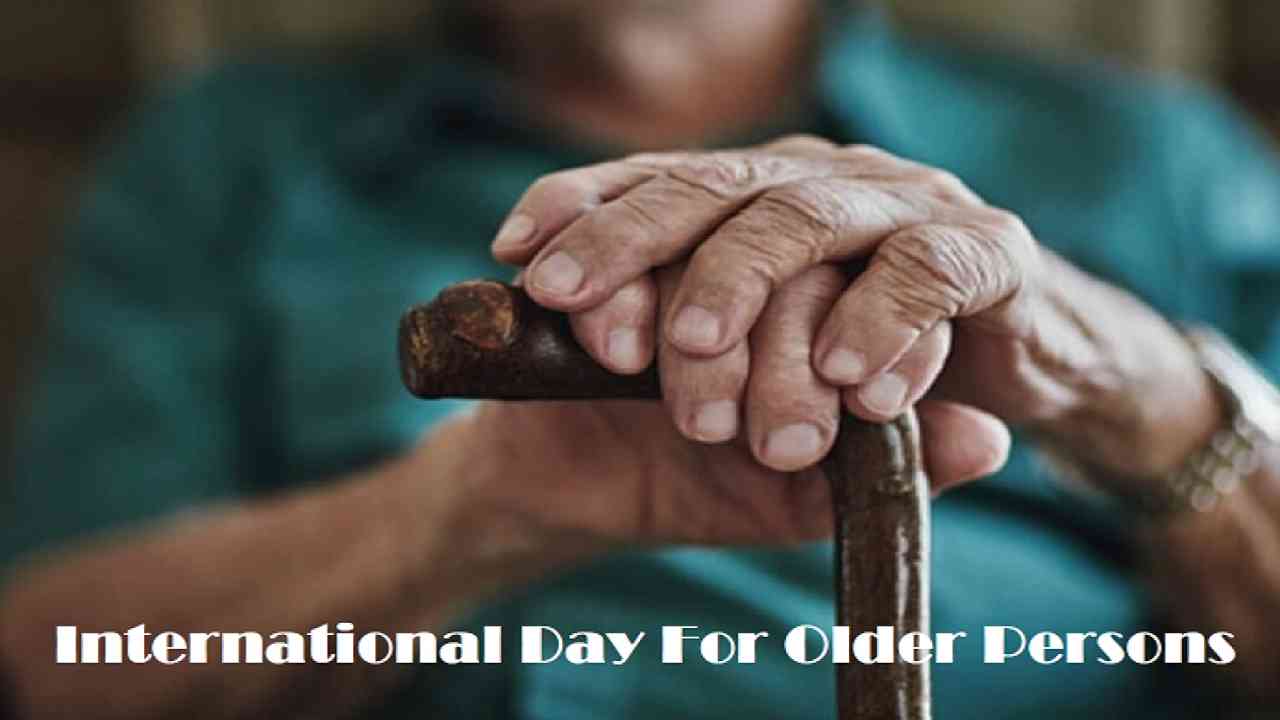International Day of Older Persons 2021: According to United Nations, by 2050, the world’s population aged 60 years and older will reach 2 billion, up from 900 million in 2015. Today, 125 million people are aged 80 years or older. On 14 December 1990, the United Nations General Assembly designated 1 October the International Day of Older Persons.
The holiday is celebrated by raising awareness about issues affecting the elderly, such as senescence and elder abuse. It is also a day to appreciate the contributions that older people make to society. The observance is a focus of ageing organizations and the United Nations Programme on Ageing.
The 2021 celebration of the 31st anniversary of International Day of Older Persons (IDOP) will focus not only on the impact of the new urban environment on older persons, but also the impact of older persons on the new urban environment.
We’re fortunate to have older people around us, whether they’re family, friends, or just general acquaintances. Older people are fonts of wisdom, experience, and storytelling. They can inspire us to continue striving — or warn us of dangers we’re unaware of. We should look to them for guidance whenever and wherever possible. Unfortunately, far too often we tend to forget — or, worse, downright ignore — the older people in our lives. That’s one of many reasons why the International Day of Older Persons on October 1 is such a terrific holiday.
International Day of Older Persons: Timeline
1948-
Human rights and the elderly
The U.N. seeks to promote “the full and equal enjoyment of all human rights and fundamental freedoms by older persons.”
1982-
Assembly on Aging
According to the United Nations, “the international community started to highlight the situation of older persons” by adopting the “World Assembly on Aging.”
1990-
U.N. proclamation
The United Nations adopted October 1 as the International Day of Older Persons. About 10 months later, the world observed the first-ever International Day of Older Persons on October 1, 1991.
HOW TO OBSERVE INTERNATIONAL DAY OF OLDER PERSONS
Chat with an older person
If we take the time to get to know an older person, even one right in our own family, we may see them in a new light and learn something about ourselves in the process.
Volunteer your time
There’s a lot that can be done to make life easier for older people. Find out about organizations in your area that work with the elderly and see what you can do to help.
Become an advocate
The United Nations says “enhanced attention to the particular needs and challenges faced by many older people is clearly required.” It’s important to recognize, as the U.N. also says, “the essential contribution the majority of older men and women can continue to make to the functioning of society.”
4 REASONS TO EMBRACE AGING
The world is getting much older
Almost 900 million people in the world are older than 60. By 2050, 2 billion people — or 22 percent of the planet’s population — will be that age. In fact, by 2050 — for the first time in human history — there will be more people over 60 than there are children in the world.
Longevity is becoming commonplace
According to the U.N., life expectancy worldwide rose from 46 to 68 years between 1950 and 2010. It’s expected to rise to 81 by the end of this century.
Happiness increases with old age
According to a recent study, most people are happiest in youth and then once they reach their 70s and 80s. Most people reported that they were the least happy in middle age.
Sex gets better, too — at least for women
Although older women may have sex less often than they did when they were young, researchers have found that sexual satisfaction improves with age. In fact, women over 80 are more likely than their younger counterparts to report a satisfying sex life.
WHY INTERNATIONAL DAY OF OLDER PERSONS IS IMPORTANT
Older people deserve our respect and attention
In addition to the wonderful things older people bring to our lives, a day set aside to honor them reminds us to take the time to be kind and humble in the presence of a long life well-lived.
We want to teach young people
The holiday is a way to educate younger people on many of the issues faced by the elderly, such as abuse and senescence — the deterioration of mental and physical processes.
We don’t know everything
If we’re lucky, age confers upon us a measure of self-awareness and wisdom. Focusing on the challenges faced by the elderly reminds us that there is still much to learn about ourselves and the world.
International Day of the Older Persons History
International Day of the Older Persons is celebrated on October 1 annually to raise awareness about various issues affecting elderly people. Many initiatives were taken up by the Vienna International Plan of Action on Ageing and it was adopted by the 1982 World Assembly on Ageing and a year later, it was endorsed by the United Nations (UN) General Assembly. On December 14, 1990, the UN General Assembly passed a resolution and designated October as the International Day of the Older Persons.
According to the statistics, there are currently 700 million people above the age of 60 and it has been predicted that by 2050, this figure will go up to 2 billion. These numbers have attracted a lot of attention and various steps have been taken to address the concerns and grievances of the old people.
International Day of the Older Persons Significance
On this day, people acknowledge the contributions made by older people to society. The World Health Organisation (WHO) organises discussions on how to provide adequate health provisions and social care for older people. The day focuses on the well-being, rights and special needs of the people.
Amid the pandemic, it has become more important to understand the struggles old people go through and steps must be taken to raise awareness of their special needs.
International Day of the Older Persons 2021 Theme : Digital Equity for All Ages
The 2021 theme “Digital Equity for All Ages” affirms the need for access and meaningful participation in the digital world by older persons.
The fourth industrial revolution characterized by rapid digital innovation and by exponential growth has transformed all sectors of society, including how we live, work and relate to one another. Technological advances offer great hope for accelerating progress towards the Sustainable Development Goals (SDGs). Yet, one-half of the global population is off-line, with the starkest contrast between the most developed countries (87%) and the least developed countries (19%) (ITU Facts and Figures 2020). Recent reports by the International Telecommunications Union (ITU) indicate that women and older persons experience digital inequity to a greater extent than other groups in society; they either lack access to technologies, or are often not benefitting fully from the opportunities provided by technological progress.
Meanwhile, as efforts to connect more people are currently underway, new risks have become apparent. For example, cybercrimes and misinformation threaten the human rights, privacy, and security of older people. The rapid speed of adoption of digital technology has outpaced policy and governance at the national, regional, and global levels. The Secretary-General’s Roadmap seeks to address these challenges by recommending concrete action to harness the best of these technologies and mitigate their risks.
Objectives of #UNIDOP2021:
- To bring awareness of the importance of digital inclusion of older persons, while tackling stereotypes, prejudice and discrimination associated with digitalization, taking into account sociocultural norms and the right to autonomy.
- To highlight policies to leverage digital technologies for full achievement of the sustainable development goals (SDGs).
- To address public and private interests, in the areas of availability, connectivity, design, affordability, capacity building, infrastructure, and innovation.
- To explore the role of policies and legal frameworks to ensure privacy and safety of older persons in the digital world.
- To highlight the need for a legally binding instrument on the rights of older persons and an intersectional person-centered human rights approach for a society for all ages.


















